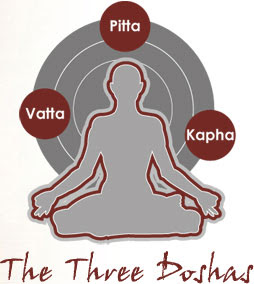
The Guiding Principles of Ayurveda
The Tridosha
The five basic eternal elements (the ‘Panchamahabhootas’) which comprise the Universe are:
| Element (English) | Element (Sanskrit ) |
| Earth
Water Fire Air Space (or Ether) |
Prithvi
Jala Agni Vayu Akash |
These eternal elements manifest in the human body as three subtle life energies – Vatha, Pitha and Kapha (collectively known as ‘Tridosha’ in Sanskrit). The word Dosha literally means that which maintains and controls the body. The air and space elements combine to form Vatha. The fire element constitutes Pitha. Earth and water elements combine to form Kapha.
| Dosha | Element |
| Vatha
Pitha Kapha |
Air and Space
Fire Earth and Water |
These subtle energies govern all biological, physiological and physio-pathological functions of the body, mind and spirit. Every individual has a unique combination of these three Doshas. Ayurveda understands the uniqueness of every individual but generally there to be seven body types, as summarised below:
| Body Type | Dosha mix |
| Mono
Dual Equal |
Either vata, pitta or kapha are predominant
Either Vata-pitta, pitta-kapha or kapha-vata Vata, pitta and kapha are in equal proportions |
Vatha Principle
| Properties | Functions | Important Sites |
| Dry
Bright Cold Rough Subtle and minute Movement |
Controls movement
Control breathing Control natural urges Tissue transformation Sensory Functions Motor Functions Controls secretions and excretions Fear Impulses Anxiety |
Large Intestine
Pelvic Regions Thighs Ears Bones Skin |
Pitha Principle
| Properties | Functions | Important sites |
| Slightly Oily
Penetration Hot Light Unpleasant Odour Spreading Nature Liquid Form |
Facilitate metabolism and Hormonal Functioning
Regulates body heat and temperature Helps digestion Understanding Intelligent Hunger and Thirst Perception Colour and Complexion Negative emotions (such as anger, hate, jealousy, etc.) |
Navel
Stomach and upper part of the small intestine Perspiration Lymph Blood Eye Skin |
Kapha Principle
| Properties | Functions | Important sites |
| Oily
Cold Heavy Slow Acting Soft Stable |
Gives stability and energy to the body
Development of the body Lubrication Enthusiasm Sexual urges Forgiveness Immune resistance Attachment Holding Possessiveness Greed Accumulation Knowledge |
Chest
Throat Head Trachea Joints Stomach Lymph Fat Tissue Nose and Tong |

great